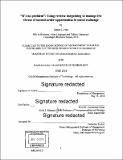"It's no problem" : using reverse bargaining to manage the threat of second-order opportunism in social exchange
Author(s)
Friis, Simon C
DownloadFull printable version (3.604Mb)
Alternative title
It is s no problem : using reverse bargaining to manage the threat of second-order opportunism in social exchange
Using reverse bargaining to manage the threat of second-order opportunism in social exchange
Other Contributors
Sloan School of Management.
Advisor
Ezra W. Zuckerman Sivan.
Terms of use
Metadata
Show full item recordAbstract
Social exchange is paradoxically characterized by actors who expect reciprocity (Blau 1986), yet vigorously downplay these expectations using language we refer to as reverse bargaining. For example, responses to thanks such as "it's no problem" and "the pleasure was all mine" are ubiquitous in social exchange. The theory of local action (Leifer 1988a; Leifer 1988b) understands reverse bargaining as a tactic that defers status claims until they are less risky to make, but this explanation is problematic because actors often initiate social exchange to create value (e.g., Uzzi 1997), not capture status. The key insight of our theory is that givers seeking reciprocity must balance two competing objectives: to ensure that the receiver recognizes a debt she must repay; and to mitigate the receiver's suspicion that the giver's ulterior motive is to capture value from the receiver. Results from two online experiments support our prediction that reverse bargaining is used to signal benign motive. The second experiment further suggests that givers will mix reverse bargaining with emphases of debt when they are anxious about reciprocity.
Description
Thesis: S.M. in Management Research, Massachusetts Institute of Technology, Sloan School of Management, 2018. Cataloged from PDF version of thesis. Includes bibliographical references (pages 44-47).
Date issued
2018Department
Sloan School of ManagementPublisher
Massachusetts Institute of Technology
Keywords
Sloan School of Management.